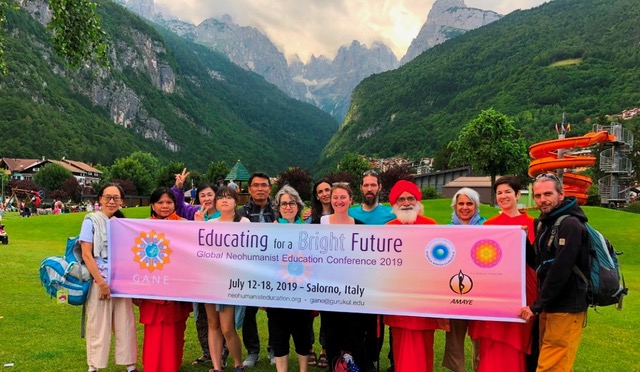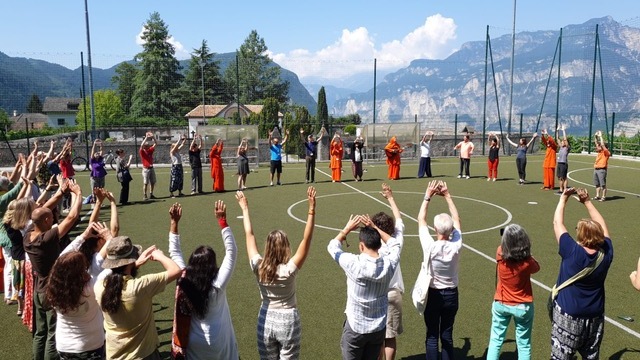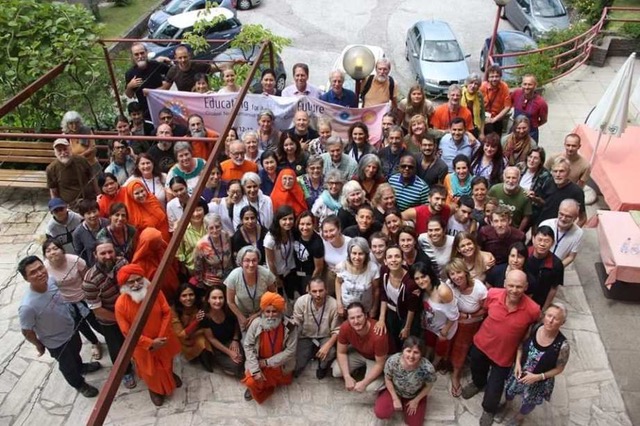Gaia University founders Andrew Langford and Liora Adler were invited to present their work on the Open Badge System and ICAFS at the recent Neohumanist Conference, Educating for a Bright Future in Italy. We met with them to talk about the conference and how Gaia U is contributing to the future of democratized education.

Vida: Tell us a little about the conference and why Gaia U got involved?
Liora: A number of years ago, Gaia U was involved in setting up a movement called ecoversities. Some members of Neohumanist Education joined, they heard about the Open Badges project from the ecoversities; and contacted us and were very interested in us coming to Italy for this conference called Educating for a Bright Future. This was a gathering of many of the Neohumanist education projects from all over the globe. So with support from the ecoversities movement, as ambassadors, we decided to attend.
Wonderful, it really sounds like a fascinating conference. I understand that you also gave a workshop on Open Badges and the ICAFS system, could you explain more about that and why you both felt this was relevant to the future of education.
Andrew: Open badges is a new-old way of accrediting skill-based learning bit-by-bit, micro-credentialing as it’s sometimes called. It frees up the range of who can be providing education, including if individuals are working on self-directed education, they could claim badges for that. So it’s a very democratizing way of learning and unlearning and building up skills. We’ve been working on putting together an ethical open badge system, that is we’re contradicting the enlightenment sciences which say there is one objective view of the world; and we’re saying that’s not the case, you need an ethical framework of human activity and the badge system needs to reflect that.
Educational accreditation systems which don’t recognize an ethical or moral base are no longer relevant, and that really fits into the Neohumanist point of view about how humans need to be part of the whole living fabric of the world and not independent rational observers as it were. So that’s what we were presenting to them and they were feeding back to us; and that was great to have a group of people who have been thinking about this a lot.
Liora: So one thing I think was very wonderful about the conference and a part of our motivation to attend is that Neohumanist education has started to include not just spirituality, not just yoga and meditation, but also permaculture in what is important in human development. So that was something that we were quite amazed and delighted by.
The other thing to note is that the open badge system was created by the Mozilla foundation, which you might know is the creator of Firefox. It is being used in many colleges and universities around the world, we learnt recently that some California colleges have adopted it. With the very rocky situation for many colleges and universities, especially in the US, there is an interest in the open badge system. So it felt incumbent on us to develop a system which has some coherence and ethics as Andrew said. That we can develop a credit system which has transference among our visionary education institutes for the skills that people need and will need going into the future for dealing with the age of climate change.
Vida: Wow this is really just so relevant. As a student and associate of Gaia U it’s amazing to me how this really just fits into the empowering and democratizing model that Gaia U gives us and I think it gives us even more freedom and more scope to create these lifelong learning journeys. It’s been a big question at Gaia U, how do we accredit this, what is valuable, how do we validate and verify knowledge. When you talk about ethics, coming from your work with the Permaculture Collab, is that drawing on Permaculture ethics?
Andrew: Yes very much so, and also the Neohumanists have a slightly different way of looking at ethics which is quite useful. Liora mentioned the Californian colleges using the Open Badge system, they are taking up badges without ethics as it were. So that’s a big missing piece in the mainstream is not having anything about earth care or people care or not having anything about reconfiguring the patterns of human existence to fit within ecological limits; that doesn’t exist in the mainstream badge systems. So that’s what we’re seeking to add in, and that fits in with the Neohumanist point of view.
Vida: Thank you for clarifying that, because I’ve also heard of badges from the tech space and there’s obviously very different approaches; but as always Gaia U is pushing a very interesting and progressive edge forward. Andrew, you also spoke about ICAFS, the International Coalition for Future Skills, I’ve always loved the term future skills, can you tell us a bit more about what ICAFs is and why it’s important?
Andrew: If you imagine multiple organisations coming together who want to create an accreditation system; this very fluid, multiple unit accreditation system which allows learners to move between providers and also allow small scale providers to be engaged and issue accredited badges. That’s the overall picture of what we’re seeking to emerge here. So there will need to be a place where new providers go to learn how to make new badges and how to have those be consistent with other badges; and there is bound to be a need for a lot of discussion about if this type of work fits into the ethical framework and if we need to expand the ethical framework so that different types of world-views are represented in a healthy way. So ICAFS is the body which stimulates those sorts of dialogues and trains everybody up and has everybody working in an international collective. That’s the big view of what’s intended.
Vida: This feels extremely groundbreaking, it feels like the Linux of education, really opening it up. I can imagine through ICAFS it will expand and have implications for people working in indigenous education and ecological restoration and all sorts of areas. So, maybe we can just expand a bit, what was the response to your workshop. Any Interesting collaborations that emerged from this work?
Liora: After the conference, at the very end of it, there was a day for follow up meetings and we had a meeting with about 6 people from the Neohumanist group on how we can move this forward. Some funding is required, obviously any project of this vision and size needs some funding, so there was some discussion around how the Neohumanist foundation may provide this. Then we also had some interest from a person working at a progressive but more traditional college in the US and she was interested in how her college might be involved in taking this forward. We have an MOU with the Neohumanist Organisation and Ananda Marga. It is something which is moving, sometimes at a slower pace because of all the projects at Gaia U which we feel are really important, but it’s moving forward. There is also a woman at the ecoversities alliance who we have made partnerships with who is starting a Hawaiian university supporting indigenous knowledge. The Permaculture Collab and Permaculture Association in Britain are both interested. So there’s a lot of interesting support for this and we’re looking forward to seeing how it emerges.

Vida: The scope is so interesting, everything from permaculture to the liberal arts colleges in the US. I read recently that big online platforms like Coursera have actually excluded all the smaller colleges and universities, so there’s this one version of the future of education that’s becoming more and more elite and exclusive; and on the other hand there’s this beautiful opening up where it’s becoming more and more democratic.
I love your vision and I think it’s one of the strong points of Gaia U. Looking at the conference in general, or other projects which you have going; what can we look forward to in the future of education and how do you see Gaia U co-creating this future?
Liora: (Laughing) That’s a good question, I think Andrew could answer that!
Andrew: I could give it a go! Very big question! So there is something really important about noticing that the current pattern of higher education is more or less controlled by governments and their systems of accreditation. The other piece is that education has been penetrated in quite a gross way by the corporate sector which also has a big influence as to what goes on. So it’s a liberation process that we are involved in, that we’re seeking to liberate post and secondary education from the corporate, government, military combine where there’s not a lot of appetite for thinking about how the bigger systems of human living needs to change in order to do the ecosystem restoration work and so on. So that’s the large scale effort that our very small intervention is seeking, to free education from those influences.
I think of window cleaning as the sort of entry point, you know; in the old days all you needed was a bicycle, a bucket and a leather cloth and you’d go out and earn your living cleaning windows. So we’re really looking to constitute education as a grass-roots network of people who know how to do things which are needed and can get those into the mainstream and provide that information for people; along with this light layer of accreditation that is needed to lend the formality that is sometimes needed for that process.
Liora: I’ll just add to that, we’re in a climate crisis, we’re in climate chaos. We have a deep recognition of the situation we’re in, despite the deep desire to deny the reality or the inability of people to figure out what it is that everyday people can do. And if you’ve read Jem Bendell on Deep Adaptation and many of the other people writing now about the realistic appraisal of the situation; we have to understand that it is important that solutions go into the hands of everyone and we all need to be working on this in some way. And I think that this sort of work will go a long way to, as you said, democratise higher education in a way that it hasn’t been before and even any of kind of education. People do look for coherence and recognition.
Speaking of future skills, one of the things Jem Bendell said brilliantly I think, is that we need to focus on preparing people. At Gaia U we are preparing people to be more agile and resilient, to think better about how to deal with situations that come up in a very precipitous and precarious environment. This joining of permaculture skills and Neohumanist understanding is that meditation and the kinds of skills which come out of meditation and yoga; these skills are also skills which enable people to understand the connection of it all. And in fact it is all connected. So the understanding of the skills that are developed in permaculture fit in well with the reflective skills developed in meditation and yoga. It feels like a very important moment to be bringing these things together and spreading them out, and that’s our vision.
Vida: Wow. I’m always blown away by your incredibly deep perception of things. It speaks to everything I’ve been exposed to and have been reading. It speaks to the climate strike generation who are saying ‘we don’t see the sense in higher education’, but at the same time are desperately seeking out skills and ways that they can be learning while doing. The Ecosystem Restoration Camps where you’re both very involved have that and this could be applied there. And also in permaculture there’s this sort of emotional layer of co-operation which in some ways is more important than learning to garden even. This has been absolutely fascinating. Thank you both so much for taking the time to speak today. Any closing thoughts?
Andrew: I can give you a couple of examples, we’re working with an organisation called the International Permaculture Education Network. They are our piloting organisation so they are leaping ahead with using the open badge system, and how they’re going to use it is to accredit land based projects. The Permaculture Association of Britain put together a project called the iLand project so that people seeking to learn about permaculture and wanting to visit a site have some idea that the site has been accredited as a worthwhile place to go. Rather than showing up as happened previously, and discovering they are just being used as cheap labour to weed the carrots.
Vida: I think we’ve all been there (laughing).
Andrew: (laughing) Yeah, so that’s an example. You create a little portfolio based open badge system so people can be confident that a site is taking their educational role seriously.
Liora: I did want to say one last thing is that what ICAFS will do is it’s turning the whole accreditation process on its head. The accreditation process until now has been based on what people try to teach a student, and whether the student manages to spit that back at some level of A, B, C. What Gaia U has been interested in doing since we began is an action learning approach: the development of a portfolio and now the open badge system, and that gives someone a realistic idea of what the student actually learned and unlearned.

Vida: Great, well thank you again for this and for the work you are doing to enlighten the future of education so that it might inform this societal transformation that is being asked of us by the climate crisis.
Check out more from the conference here and see the conference video here.
Very Nice